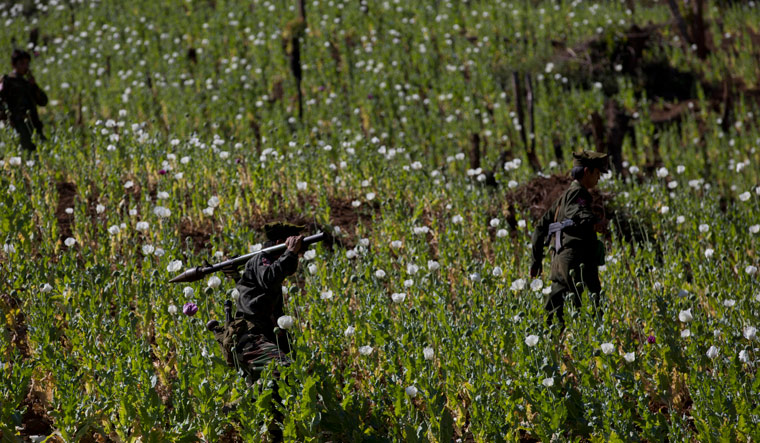The recent UN agency report released reveals Myanmar as the world's top opium producer. A country torn by a brutal civil war has regained its top spot surpassing Afghanistan.
After Taliban taking over Afghanistan, it had imposed a ban on its opium production. According to the United Nations Office on Drugs and Crime’s (UNODC) Southeast Asia Opium Survey 2023, Taliban's ban had led to a 95 per cent drop in the cultivation of opium poppies.
As per the UNODC report, Myanmar saw an increase of 18 per cent in the land area for the cultivation of the crop. The increased area would be about 47,100 hectares of land.
Experts opine that the poppy cultivation in Myanmar is expanding and becoming more productive.
Exceeding the previous record in 2022, estimated opium yield expanded by 16 per cent to 22.9 kilograms per hectare (20.43 pounds per acre) this year. Increase in sophisticated means of cultivation, including increased plot density, improved organisation of plants, and enhanced practices, such as the use of irrigation systems and potentially fertilizers led to the rise in yields.
Also, it is noted that the violent political turmoil in Myanmar has increased the opium production.
The economic, security and governance disruptions that followed the military takeover of February 2021 continue to drive farmers in remote areas towards opium to make a living, said UNODC Regional Representative Jeremy Douglas, reported The Associated Press.
The report also notes that the opium poppy cultivation in Southeast Asia is closely linked to poverty, lack of government services, challenging macroeconomic environments, instability, and insecurity.
Earlier, the production of opium and heroin flourished in northeastern Myanmar, which is part of the Golden Triangle, where the borders of Myanmar, Laos and Thailand meet. The Myanmar government could exercise only minimum control in the region that led to an opium boom that included drug trade as well.
In a statement, UNODC said that the region's flourishing drug production feeds into a growing illicit economy... which brings together continued high levels of synthetic drug production and a convergence of drug trafficking, money laundering and online criminal activities including casinos and scam operations, reported AP.


